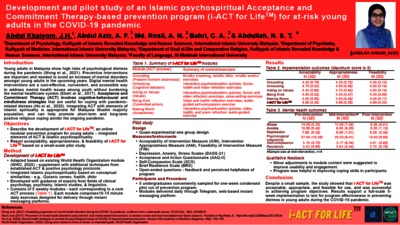Abdul Khaiyom, Jamilah Hanum and Abdul Aziz, Amani Fadzlina and Md. Rosli, Ahmad Nabil and Bahari, Che Amnah and Abdullah, Nur Sakinah Thomas (2021) Development and pilot study of an Islamic psychospiritual Acceptance and Commitment Therapy-based prevention program (i-ACT for LifeTM) for at-risk young adults in the COVID-19 pandemic. In: 7th Asian Cognitive Behavior Therapy Conference, 5th - 7th July 2021, Online. (Unpublished)
|
PDF
- Supplemental Material
Restricted to Registered users only Download (338kB) | Request a copy |
||
![[img]](http://irep.iium.edu.my/95852/2.hassmallThumbnailVersion/30_Jamilah%20Hanum_5422.gif)
|
PDF
- Submitted Version
Download (105kB) | Preview |
Abstract
Objective Young adults in Malaysia are at high risk of psychological distress. Despite rising mental health concerns in the ongoing pandemic, limited efforts have been initiated to address this issue, and none have catered to the religio-cultural characteristics of Malaysia’s Muslim majority population. This study aims to describe and report the development and pilot study of an online modular prevention program based on Acceptance and Commitment Therapy (ACT) featuring integrated elements of Islamic spirituality (i-ACT for LifeTM). Methods An existing WHO ACT-based module was adapted with the help of expert guidance to include elements of Islamic spirituality as well as to fit the study’s context. The prevention program consists of five weekly modules (Grounding, Unhooking, Acting on Values, Being Kind, and Making Room) that each corresponds to an ACT core process, and was designed for delivery through web-based instant messaging platforms. Five Malaysian university students were conveniently sampled for a one-week condensed pilot run of the prevention program. Participants completed outcome assessments at pre-, mid-, and post-intervention, and rated the acceptability, appropriateness, and feasibility of each module and the overall prevention program. Results Descriptive analyses showed a decrease in participants’ anxiety, stress, and depression, and an increase in psychological flexibility, self-compassion, and resilience. Participants rated each module favourably, with the overall program receiving high ratings of acceptability (M=4.50, SD=0.35), appropriateness (M=4.60, SD=0.38), and feasibility (M=4.8, SD=0.33). Qualitative feedback revealed that i-ACT for LifeTM was helpful for the participants and was successful in achieving program objectives. Conclusion Despite a small sample size, results of the pilot study indicate that the prevention program was highly accepted, appropriate, and feasible, and may support a full-scale 5-week implementation for prevention of psychological distress in Malaysian young adults during the pandemic.
Actions (login required)
 |
View Item |


 Download Statistics
Download Statistics Download Statistics
Download Statistics